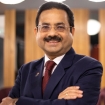Clinicians’ Corner: A physician executive’s view from India
HRI spoke with Dr. Rana Mehta, PwC partner and healthcare leader in India. Dr. Mehta has worked with India’s largest healthcare provider, as well as large, integrated health systems and payers in Asia, the Middle East and Africa.
PwC Health Research Institute (HRI):
How is India, with a population of 1.3 billion, coping with the COVID-19 pandemic?

Dr. Rana Mehta, PwC Partner and Healthcare Leader in India:
Being a large country with a huge population presents its own unique set of challenges. Currently most of the COVID cases have been confined to the large cities, which have the requisite healthcare infrastructure to deal with it. However, in the cities, the high density of the population in certain areas makes it next to impossible to practice social distancing or isolate suspect cases.
India was one of the first countries to impose a stringent nationwide lockdown. This has gone a long way in reducing the spread of the virus and helped the nation ramp up its critical public healthcare infrastructure.
HRI: What are some of the unique challenges that healthcare providers face in the country?
Dr. Rana Mehta: Over 70% of the healthcare delivery in India is done through the private sector. However, the public sector is currently at the forefront of this epidemic. Going ahead, this would require both the public and private sectors to join hands and deliver care not only in the urban conglomerates but in rural areas.
The first step in this direction has been the government allowing private sector labs to test for the disease.
The Calmette-Guerin (BCG) vaccine, which is a vaccine for tuberculosis, is being tested to see if it reduces the severity of the disease, especially among healthcare workers and those with comorbidities.
Looking ahead in the immediate future, there will be a fundamental change both in how healthcare demand is generated and in innovative models to deal with supply. The demand for primary care, which is predominantly delivered in a face-to-face environment, will now shift to the virtual space.
HRI: What role has testing played in India’s response?
Dr. Rana Mehta: Globally, testing has been the bedrock for any decision-making related to identification and isolation of suspected cases. India has ramped up its testing capacity significantly in the last three weeks.
The government has also used some of the most stringent norms when it comes to certifying testing kits in terms of sensitivity and specificity to ensure that the test results are accurate. Antigen antibody testing has also started for surveillance and monitoring.
HRI: How will COVID-19 change healthcare delivery?
Dr. Rana Mehta: This disease, like Ebola, impacts healthcare workers and patients. Given this risk, there has been an exponential increase in virtual health tools for both diagnosis and treatment.
Usage of telemedicine has probably gone up by a factor of 10 in 10 weeks’ time. In normal circumstances, this would have taken a couple of years.
Looking ahead in the immediate future, there will be a fundamental change both in how healthcare demand is generated and in innovative models to deal with supply. The demand for primary care, which is predominantly delivered in a face-to-face environment, will now shift to the virtual space.
India has a host of health companies, from startups to large corporations, that are well positioned to cater to this “new normal” in the delivery space.
Contact us














